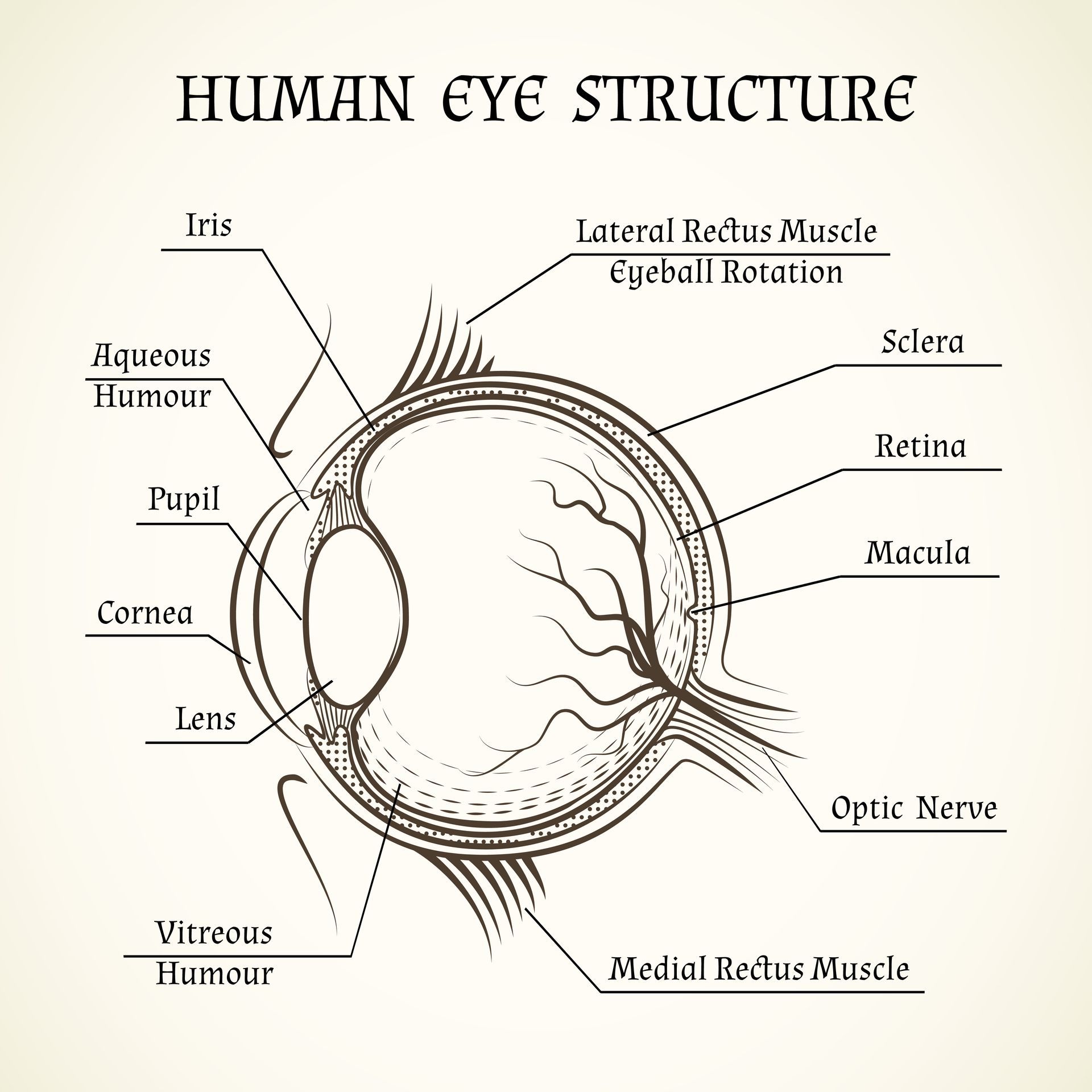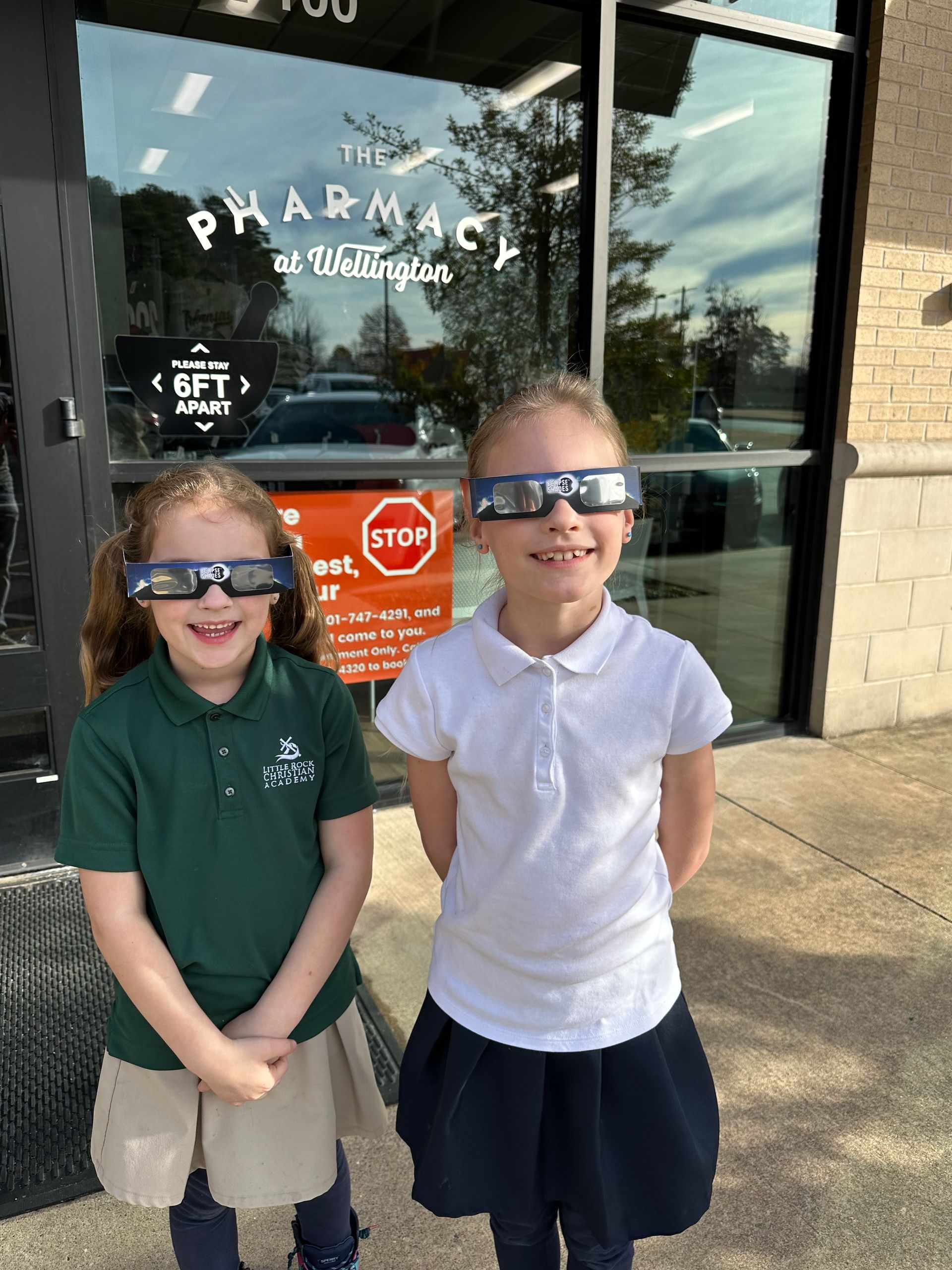Our Eyes and the Eclipse
Knowledge is power, as they say, and today's blog is intended to help us do our homework in preparation for the upcoming solar eclipse which will be visible from Arkansas. It will be on Monday, April 8, 2024, at around 12:30 p.m. to 1:50 p.m., depending on one's location and the percentage of the sun eclipsed.
Can I look at the sun directly whether there's an eclipse or not?
Since exposure to the sun's ultraviolet (UV) light can cause permanent damage in less than a minute, the prudent answer is "no".
What happens if I do look at the sun directly? If there's damage, why doesn't it hurt?
Our eyes' retina captures light and converts the signal to one that our brain uses to interpret the image we see. The retina, however, is vulnerable to damage by light, also called photochemical damage.
Since the retina does not have any pain receptors, we can't tell if we're looking at the sun long enough to cause damage. Sometimes, damage doesn't become evident until hours afterwards or even the next day. The retina's photoreceptors can function a bit before they become disabled or die.
Can I look at the sun during the few seconds where there is a total eclipse?
It is best not to do so since the pupils will be more dilated during those few seconds of darkness and the first rays that come through could penetrate the eye more easily and cause damage. It is difficult to time it just right, to stop looking at a full eclipse just a moment before the moon doesn't block out the sun completely. The risk to our eyes is not worth it.

Designed by Macrovector on Freepik
What kind of eye damage can occur due to exposure to UV rays?
The various diseases include:
Pterygium - a growth on the cornea (the cornea is a vital protective layer of the eye, at the front of the eye) that can cause vision impairment in the later stages of the disease. This disease is more common when a person spends hours outside during the day (for example, surfers, skiers, fishermen, farmers, outside construction workers, etc.).
Cataracts - this is when the eye's natural lens becomes cloudy. Symptoms include blurry vision, seeing double, being extra sensitive to light, having trouble seeing well at night, and seeing bright colors as faded or yellow.
Macular Degeneration (MD) - the macula, the part of the retina that processes our central vision, allows us to focus on small details in front of us. In MD, the macula is damaged and we gradually lose vision from the center of the picture in front of us. With MD, over time we gradually lose more and more vision, moving out from the center.
Solar retinopathy, or "eclipse retinopathy" - caused by looking at the sun directly or indirectly during an eclipse, can result in blurry vision or a blind spot. Vision often recovers back to normal levels between 3 and 9 months, although sometimes damage is irreversible.
To note, the lenses in children's eyes are more transparent, letting in more UV light, so it's even more important to protect their eyes against the sun's UV rays, especially when considering that cumulative exposure can be very damaging.
What can I do to prevent eye damage due to UV rays?
Multiple precautions can help and utilizing several at the same time will provide more protection. Options include:
- wearing a hat with a wide brim
- wearing glasses with coatings that block UV rays
- wearing sunglasses and/or contact lenses with UV filters
- wearing skiing goggles when skiing
- wearing eclipse viewing glasses as they are specially designed to absorb 99.9% of the sunlight (regular sunglasses typically absorb about 90%)
- avoiding going outside when the sun is at its strongest, from midday to early afternoon
- being extra careful when outside at higher altitudes, when around water, ice, or snow
Bottom line
Don't turn a blind eye to the potential dangers of eye exposure to sunlight.
Let's hope that April 8th won't be a cloudy day! We have a supply of eclipse glasses at the pharmacy -- drop by to pick some up, or add them to your prescription delivery.
References and resources:
- National Eclipse on viewing in Arkansas - https://nationaleclipse.com/states/2024-total-solar-eclipse-arkansas.html
- American Academy of Ophthalmology on cataracts - https://www.aao.org/eye-health/diseases/what-are-cataracts
- Cleveland Clinic on the macula - https://my.clevelandclinic.org/health/body/23185-macula
- Cleveland Clinic on the cornea - https://my.clevelandclinic.org/health/body/21562-cornea
- National Library of Medicine, article Effects of Solar Radiation on the Eyes - https://www.ncbi.nlm.nih.gov/pmc/articles/PMC9709587/
- National Geographic on protecting our eyes from the sun - https://www.nationalgeographic.com/science/article/sun-damage-eyes-solar-eclipse-protection
- American Academy of Ophthalmology on the sun, UV light, and your eyes - https://www.aao.org/eye-health/tips-prevention/sun
- Mayo Clinic on eyes and the eclipse - https://newsnetwork.mayoclinic.org/discussion/eyes-on-the-eclipse-serious-damage-can-occur-from-staring-at-the-sun/
- American Academy of Ophthalmology on solar retinopathy - https://eyewiki.aao.org/Solar_Retinopathy
- Wikipedia article on the retina - https://en.wikipedia.org/wiki/Retina
- Macular Degeneration Research on whether bright lights are damaging to the eye - https://www.brightfocus.org/macular/article/are-bright-lights-damaging-eye
- National Library of Medicine article on photochemical damage of the retina - https://pubmed.ncbi.nlm.nih.gov/16950247/
- National Library of Medicine abstract about photochemical damage of the retina - https://pubmed.ncbi.nlm.nih.gov/16950247/





